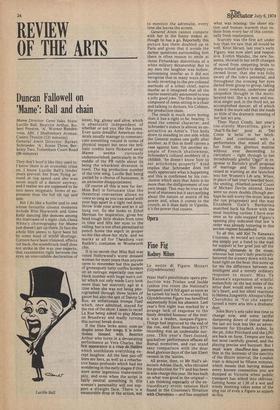2 REVIEW
OF THE ARTS
Duncan FaHowell on 'Mame': Ball and chain
Mame Director: Gene Saks. Stars: Lucille Ball, Beatrice Arthur, Robert Preston, 'A', Warner Rendezvous. ABC I Shaftesbury Avenue, Casino Theatre (131 minutes) General Amin Director: Barbet Schroeder. 'A', Scene Three, Berkeley Two, Tottenham Court Road (90 minutes) They don't hoof it like they used to. I know there is an economic crisis on, I know Lucille Ball's tender years prevent her from flying around at top speed and she was never much of a dancer anyway, and I realise we are supposed to be into more enigmatic forms of expression than the full tilt tap and spin.
But I do like a hoofer and to one whose favourite cinema moments include Rita Hayworth and Gene Kelly dancing like demons among the staircases of a night club, Onna White's choreography for Mame just doesn't get up there. In fact the whole film seems to have been hit by some kind of world shortage. Corners have been trimmed, effects cut back, the soundtrack itself does not strike in the way one expects, that razzmatazz right between the eyes, an unavoidable declaration of intent, big, glossy and alive, which is absolutely independent of whether or not you like the tunes. Even quite dreadful American musicals usually manage to communicate something rotund in terms of physical impact but once the brilliant credits have flickered away Marne seems curiously undernourished, particularly in the middle of the PR rattle about its being the whackiest diversion in town. The big production number of the title song, Lucille Ball being jostled by a chorus of huntsmen, is an awesome disappointment.
Of course all this is new for her. Miss Ball is fortunate that the theatrical convention allows no voice so long as you can stand with your legs apart in a tight red dress, throw wide your arms and let it all hang out. So she looks to Ethel Merman for inspiration, gives her head tough little shakes from time to time and lifts her eyes to the ceiling, but is not often permitted to punch home the esprit in proper no-biz-like-show-biz style, and no marks at all for Th,eadora van Runkle's costumes in Woolworth chic.
It is no secret that Miss Ball was voted Hollywood's worst dressed woman for more years than anyone cares to remember but this parade of grotesquely tatty outfits borders on an outrage, especially one neat black number with huge nun's collar which not only made Lucy look more than her matronly age at a time when she was not being photographed through three layers of gauze but also the spit of Danny La Rue, an unfortunate trompe l'oeil which, once admitted, stayed for the rest of the show. I seem to recall La Rue being asked to play Mame on Broadway and madly turning this surreal break down.
If _the films lacks sonic. oom-pa despite some fine songs, it is nonetheless blessed with Beatrice Arthur who turns in a devastating performance as Vera Charles. Her first appearance is a coup de thedtre which annihilates everything except laughter. All the best pay-off lines are hers, as well as a rebarbative basso profundo which had me wondering in the early stages if this were some ingenious transvestite ploy, and even when the script is fairly neutral something in this woman's personality will not support a straight face. There is a measurable drop in the action, not
to mention the adrenalin, every time she leaves the screen.
General Amin cannot compete with her in the funny stakes although he has a go. Reportedly this picture has them doubled up in Paris and given that it avoids the darker questions surrounding him there is often reason to smile at these Firbankian distortions of a white military dictatorship'. But to my ears the laughter was hollow, patronising insofar as it did not recognise that in many ways Amin is only reverting to the pre-colonial methods of a tribal chief, naive insofar as it imagined that all the matter essentially amounted to was a jolly good joke. The film is largely composed of Amin sitting in a chair and talking to doctors, his Cabinet, the production team.
The result is much more boring than it has a right to be, bearing "n mind the central character, and Schroeder's stance is almost as unattractive as Amin's. This boils down to standing to one side while the General makes one gaffe after another, as if this in itself carries a case against him. Yet another ex ample of French shallowness, Schroeder's cultural snobbery of a childish "he doesn't know how to eat artichokes properly" kind implies that Schroeder does not really appreciate what is happening and this is confirmed by his conclusion which says that Amin is no more than the disfigurement of our own image. That may be true at the level of manners but it says nothing about the nature or source of his power and, when it comes to the crunch, as it does daily in Uganda, it's the power that counts.


































 Previous page
Previous page